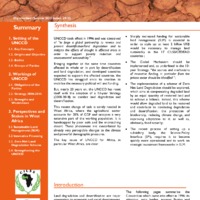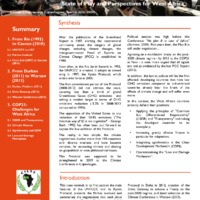Recherche
2 items
United nations convention to combat desertification (UNCCD) : State of play and perspectives for west africa
UNCCD took effect in 1996 and was conceived of "to forge a global partnership to reverse and prevent desertification/land degradation and to mitigate the effects of drought in affected areas in order to support poverty reduction and environmental sustainability." Bringing together at the same time countries affected in whole or in part by desertification and land degradation, and developed countries expected to support the affected countries, the UNCCD has struggled since its creation to mobilise the necessary political will and funding. But, nearly 20 years on, the UNCCD has reset itself with the adoption of a 10-year Strategy (2008-2018) to combat land degradation and desertification. This recent change of tack is sorely needed in West Africa, where the agricultural sector accounts for 35& of GDP and occupies a very extensive part of the working population. It is handicapped by poor soils and the encroaching desert. These phenomena are exacerbated by already very perceptible changes to the climate and powerful demographic pressures. The key issues of UNCCD for Africa, in particular West Africa, are clear: Introduction Land degradation and desertification are major constraints to economic and social development. Inspired by that realisation, African, Latin American, and Mediterranean leaders called into being the UN Convention to Combat Desertification (UNCCD). Translation: Peter Gaechter, SOS Sahel Sharply increased funding for sustainable land management (SLM) is essential in order to scale up: at least 2 billion US$ would be necessary to manage land sustainably in the 17 CILSS/CEDEAO countries ; The Global Mechanism should be implemented and, as underlined in the 10year Strategy, “the sources and mechanisms of innovative funding, in particular from the private sector should be identified ”; The implementation of a scheme of Zero Net Land Degradation should be explored, which aims at compensating degraded land by an equal quantity of restored land and to achieve a balance. Indeed, this scheme would allow degraded land to be restored and contribute to combating degradation and desertification, the protection of biodiversity, reducing climate change, and improving adaptation to it, as well as, obviously, food security; The recent process of setting up a subsidiary body, the Science-Policy Interface (SPI), requires it to become quickly more operational and to work on strategic investment frameworks in SLM.
United nations framework convention on climate change (unfccc) state of play and perspectives for west africa
After the publication of the Brundtland Report in 1987, alerting the international community about the dangers of global changes, including climate changes, the Intergovernmental Panel of Experts on Climate Change (IPCC) is established in 1988. Soon after, at the Rio Earth Summit in 1992, the UNFCCC is created. It adopts an armed wing in 1997, the Kyoto Protocol, which enters into force in 2005. The first commitment period of the Protocol (2008-2012) did not address the issue, covering less than a third of global Greenhouse Gases (GHG) emissions and setting a modest target in terms of GHG emissions reduction (-5.2& in 2008-2012 compared to 1990). The opposition of the United States to any reduction of their GHG emissions ("The American way of life is not negotiable!" - George Bush, 1992) has often been put forward to explain the low ambition of the Protocol. The reality is less simple: the climate negotiations involve more than 190 countries with diverse interests and have become complex, far exceeding climate and abuting on geopolitical or even philosophical issues. This Protocol was supposed to be strengthened in 2009 at the Climate Conference in Copenhagen. Political tension was high before this Conference: "No plan B in case of failure" (Barroso, 2009). Five years later, the Plan B is still under negotiation... Agreeing on a multilateral treaty on the post2020 climate regime - by 2015 at the COP21 in Paris - is even more urgent that all signals are red, as evidenced by the last IPCC Report (2013). In addition, the last to pollute will be the first affected: developing countries that have low GHG emissions compared to industrialised countries already bear the brunt of the effects of climate change and will suffer even more. In this context, the West African countries ardently defend their positions: • Applying the principles of "Common But Differentiated Responsibility" (CBDR) and "Transparency" and asking the developed countries to be exemplary; • Increasing greatly climate finance in particular for adaptation; • Integrating agroforestry in the Clean Development Mechanism (CDM); • Operationalising the “Loss and Damage Mechanism”.

